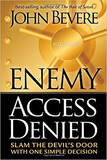II Corinthians 11
 Steve Gallagher
Steve Gallagher
"Never underestimate the power and devices of the enemy. The Bible confirms this: But I am afraid, lest as the serpent deceived Eve by his craftiness, your minds should be led astray from the simplicity and purity of devotions to Christ. (II Corinthians 11:3) And no wonder, for even Satan disguises himself as an angel of light. (II Corinthians 11:14) ....in order that no advantage be taken of us by Satan; for we are not ignorant of his schemes (II Corinthian 2:11) Be of sober spirit, be on the alert. Your adversary, the devil, prowls about like a roaring lion, seeking someone to devour (I Peter 5:8).
Make no mistake, demons will do anything they can to get the believer to fall in order to draw him away from the Lord. They are brilliant strategists who have probably been following the man since he was born. They are knowledgable of his weaknesses and know exactly how to entice him into their snares." --Steve Gallagher; At The Idol of Sexual Idolatry
Make no mistake, demons will do anything they can to get the believer to fall in order to draw him away from the Lord. They are brilliant strategists who have probably been following the man since he was born. They are knowledgable of his weaknesses and know exactly how to entice him into their snares." --Steve Gallagher; At The Idol of Sexual Idolatry
II Corinthians 11:5-13:
5 For I consider that I am not at all inferior to the most eminent apostles. 6 Even though I am untrained in speech, yet I am not in knowledge. But we have been thoroughly manifested among you in all things.
7 Did I commit sin in humbling myself that you might be exalted, because I preached the gospel of God to you free of charge? 8 I robbed other churches, taking wages from them to minister to you. 9 And when I was present with you, and in need, I was a burden to no one, for what I lacked the brethren who came from Macedonia supplied. And in everything I kept myself from being burdensome to you, and so I will keep myself. 10 As the truth of Christ is in me, no one shall stop me from this boasting in the regions of Achaia. 11 Why? Because I do not love you? God knows!
12 But what I do, I will also continue to do, that I may cut off the opportunity from those who desire an opportunity to be regarded just as we are in the things of which they boast.
13 For such are false apostles, deceitful workers, transforming themselves into apostles of Christ.
5 For I consider that I am not at all inferior to the most eminent apostles. 6 Even though I am untrained in speech, yet I am not in knowledge. But we have been thoroughly manifested among you in all things.
7 Did I commit sin in humbling myself that you might be exalted, because I preached the gospel of God to you free of charge? 8 I robbed other churches, taking wages from them to minister to you. 9 And when I was present with you, and in need, I was a burden to no one, for what I lacked the brethren who came from Macedonia supplied. And in everything I kept myself from being burdensome to you, and so I will keep myself. 10 As the truth of Christ is in me, no one shall stop me from this boasting in the regions of Achaia. 11 Why? Because I do not love you? God knows!
12 But what I do, I will also continue to do, that I may cut off the opportunity from those who desire an opportunity to be regarded just as we are in the things of which they boast.
13 For such are false apostles, deceitful workers, transforming themselves into apostles of Christ.
|
II Corinthians 11:14-15:
And no wonder! For Satan himself transforms himself into an angel of light. 15 Therefore it is no great thing if his ministers also transform themselves into ministers of righteousness, whose end will be according to their works. |
Without the light of the scripture, we all are nothing but a prayer for the devil to do his thing in politics and religion (2 Corinthians 11:14-15; Timothy 2:24-26).
|

Christian Nationalism can find some support for its views in the Old Testament, but it fails to take into account the political theology of Jesus and the apostles. A complete survey of the New Testament reveals that the apostles dealt with theological disputes through the church, apart from government action. Consider the strong language the apostle Paul used of the false teachers in Corinth. The context of the passage is Paul’s stinging reply to the “super-apostles” who charged Paul with preaching an unauthorized gospel given to him by men. In response, Paul had no hesitation in using this language of his critics: “So it is no surprise if [Satan’s] servants, also, disguise themselves as servants of righteousness. Their end will correspond to their deeds” (2 Cor 11:15). Despite unmasking these churchmen as Satan’s servants, he never advocates turning them over to the authorities for punishment, though clearly, the issues at stake in Corinth were matters of eternal significance. In those days, professing Christians suffered persecution from Jewish authorities and, increasingly, the Roman Empire. If Paul viewed theological disputes as being within the legitimate purview of the state, he could have easily suggested that the Corinthian Christians turn these false teachers over to the Jewish leaders or Roman authorities. He doesn’t.
Perhaps the most significant teaching relevant to this discussion is recorded in Matt 19. In the preceding verses, the Pharisees had been told by Jesus that in the marital union, husband and wife are joined together by God as one flesh: therefore man should not separate what God joined. They respond by asking why Moses allowed them to divorce their wives at will. Jesus responds, “Because of your hardness of heart Moses allowed you to divorce your wives, but from the beginning, it was not so. And I say to you: whoever divorces his wife, except for sexual immorality, and marries another, commits adultery” (Matt 19:8-9).
Jesus makes it clear that, even in theocratic Israel, God made legal exceptions for certain immoral activities, here, illegitimate divorce (Matt 5:32). This was done because of the hardness of the Israelites’ hearts.
This concession is relevant to the discussion of Christian Nationalism. If even in theocratic Israel certain sins were tolerated by the government because of the people’s hardness of heart, it would seem even more appropriate that we who live under the new covenant begun by Christ should tolerate some sins and theological errors because of a similar hardness. I would argue that external religious practice would fall under this category. Religion is one of the things people keep closest to their hearts, and is the most difficult thing to change, even under threat of government action. Ephesians 2:1 describes unbelievers as being dead in their sins. Isn’t this the epitome of a hard heart? Arguing from the principle of the lessor-to-the-greater, if divorce was allowed because of hardness of heart, shouldn’t the exercise of false religion be as well?
There are very practical dangers to a Christian government that punishes the practice of heretical views through state action. The likely result of forcing heresy underground and creating a black market of ideas instead of addressing falsehood head-on in the open debate should concern Christians thoughtfully considering these issues. Giving the government the power to determine what is and what is not heresy can also have dangerous consequences, as seen in the Inquisition, witch trials, and numerous examples of abuse of power. Even today Christian churches disagree on theology and morality and who can say that the brand of Christianity the nationalist state supports is your brand?
Pragmatic reasoning aside, Christ and His apostles teach that false doctrine and unbelief, while serious matters, are things that should be left out of the government’s hands. If we wish to apply the Bible’s teachings faithfully in this subject, we should repudiate Christian Nationalism and seek a better way to address the issues plaguing modern society.
--Mason Dees; Religious Liberty TV; The Popularity and Pitfalls of Christian Nationalism 8.21.23
Perhaps the most significant teaching relevant to this discussion is recorded in Matt 19. In the preceding verses, the Pharisees had been told by Jesus that in the marital union, husband and wife are joined together by God as one flesh: therefore man should not separate what God joined. They respond by asking why Moses allowed them to divorce their wives at will. Jesus responds, “Because of your hardness of heart Moses allowed you to divorce your wives, but from the beginning, it was not so. And I say to you: whoever divorces his wife, except for sexual immorality, and marries another, commits adultery” (Matt 19:8-9).
Jesus makes it clear that, even in theocratic Israel, God made legal exceptions for certain immoral activities, here, illegitimate divorce (Matt 5:32). This was done because of the hardness of the Israelites’ hearts.
This concession is relevant to the discussion of Christian Nationalism. If even in theocratic Israel certain sins were tolerated by the government because of the people’s hardness of heart, it would seem even more appropriate that we who live under the new covenant begun by Christ should tolerate some sins and theological errors because of a similar hardness. I would argue that external religious practice would fall under this category. Religion is one of the things people keep closest to their hearts, and is the most difficult thing to change, even under threat of government action. Ephesians 2:1 describes unbelievers as being dead in their sins. Isn’t this the epitome of a hard heart? Arguing from the principle of the lessor-to-the-greater, if divorce was allowed because of hardness of heart, shouldn’t the exercise of false religion be as well?
There are very practical dangers to a Christian government that punishes the practice of heretical views through state action. The likely result of forcing heresy underground and creating a black market of ideas instead of addressing falsehood head-on in the open debate should concern Christians thoughtfully considering these issues. Giving the government the power to determine what is and what is not heresy can also have dangerous consequences, as seen in the Inquisition, witch trials, and numerous examples of abuse of power. Even today Christian churches disagree on theology and morality and who can say that the brand of Christianity the nationalist state supports is your brand?
Pragmatic reasoning aside, Christ and His apostles teach that false doctrine and unbelief, while serious matters, are things that should be left out of the government’s hands. If we wish to apply the Bible’s teachings faithfully in this subject, we should repudiate Christian Nationalism and seek a better way to address the issues plaguing modern society.
--Mason Dees; Religious Liberty TV; The Popularity and Pitfalls of Christian Nationalism 8.21.23
II Corinthians 11:16-23:
16 I say again, let no one think me a fool. If otherwise, at least receive me as a fool, that I also may boast a little.
17 What I speak, I speak not according to the Lord, but as it were, foolishly, in this confidence of boasting.
18 Seeing that many boast according to the flesh, I also will boast.
19 For you put up with fools gladly, since you yourselves are wise!
20 For you put up with it if one brings you into bondage, if one devours you, if one takes from you, if one exalts himself, if one strikes you on the face.
21 To our shame I say that we were too weak for that! But in whatever anyone is bold—I speak foolishly—I am bold also.
22 Are they Hebrews? So am I. Are they Israelites? So am I. Are they the seed of Abraham? So am I.
16 I say again, let no one think me a fool. If otherwise, at least receive me as a fool, that I also may boast a little.
17 What I speak, I speak not according to the Lord, but as it were, foolishly, in this confidence of boasting.
18 Seeing that many boast according to the flesh, I also will boast.
19 For you put up with fools gladly, since you yourselves are wise!
20 For you put up with it if one brings you into bondage, if one devours you, if one takes from you, if one exalts himself, if one strikes you on the face.
21 To our shame I say that we were too weak for that! But in whatever anyone is bold—I speak foolishly—I am bold also.
22 Are they Hebrews? So am I. Are they Israelites? So am I. Are they the seed of Abraham? So am I.
|
II Corinthians 11:23-25:
23 Are they ministers of Christ?—I speak as a fool—I am more: in labors more abundant, in stripes above measure, in prisons more frequently, in deaths often. 24 From the Jews five times I received forty stripes minus one. 25 Three times I was beaten with rods; once I was stoned; three times I was shipwrecked; a night and a day I have been in the deep; |

Pastor Joe McKeever: How the preacher can sound really smart
“I speak as a fool” (2 Corinthians 11:23). Now, the solid born-again, God-called messenger of the Lord has no wish to sound particularly smart. True, he does not want to come across as ignorant, but he is not insecure, has nothing to prove, and is not there to impress. He is a messenger, delivering the word of God, then getting out of the way.* However, a less than solid preacher just might want to impress his hearers. An insecure, insincere preacher–one working for the paycheck and seeking the prestige some people bestow on a pastor–might want to bolster his image by dressing up his presentation in some way, and could use some assistance. That’s where we come in. We can help. Herewith then is our list of tricks which a poor preacher might want to employ. 11.26.22 |
II Corinthians 11:27-33:
27 in weariness and toil, in sleeplessness often, in hunger and thirst, in fastings often, in cold and nakedness--
28 besides the other things, what comes upon me daily: my deep concern for all the churches.
29 Who is weak, and I am not weak? Who is made to stumble, and I do not burn with indignation?
30 If I must boast, I will boast in the things which concern my infirmity.
31 The God and Father of our Lord Jesus Christ, who is blessed forever, knows that I am not lying.
32 In Damascus the governor, under Aretas the king, was guarding the city of the Damascenes with a garrison, desiring to arrest me;
33 but I was let down in a basket through a window in the wall, and escaped from his hands.
27 in weariness and toil, in sleeplessness often, in hunger and thirst, in fastings often, in cold and nakedness--
28 besides the other things, what comes upon me daily: my deep concern for all the churches.
29 Who is weak, and I am not weak? Who is made to stumble, and I do not burn with indignation?
30 If I must boast, I will boast in the things which concern my infirmity.
31 The God and Father of our Lord Jesus Christ, who is blessed forever, knows that I am not lying.
32 In Damascus the governor, under Aretas the king, was guarding the city of the Damascenes with a garrison, desiring to arrest me;
33 but I was let down in a basket through a window in the wall, and escaped from his hands.











